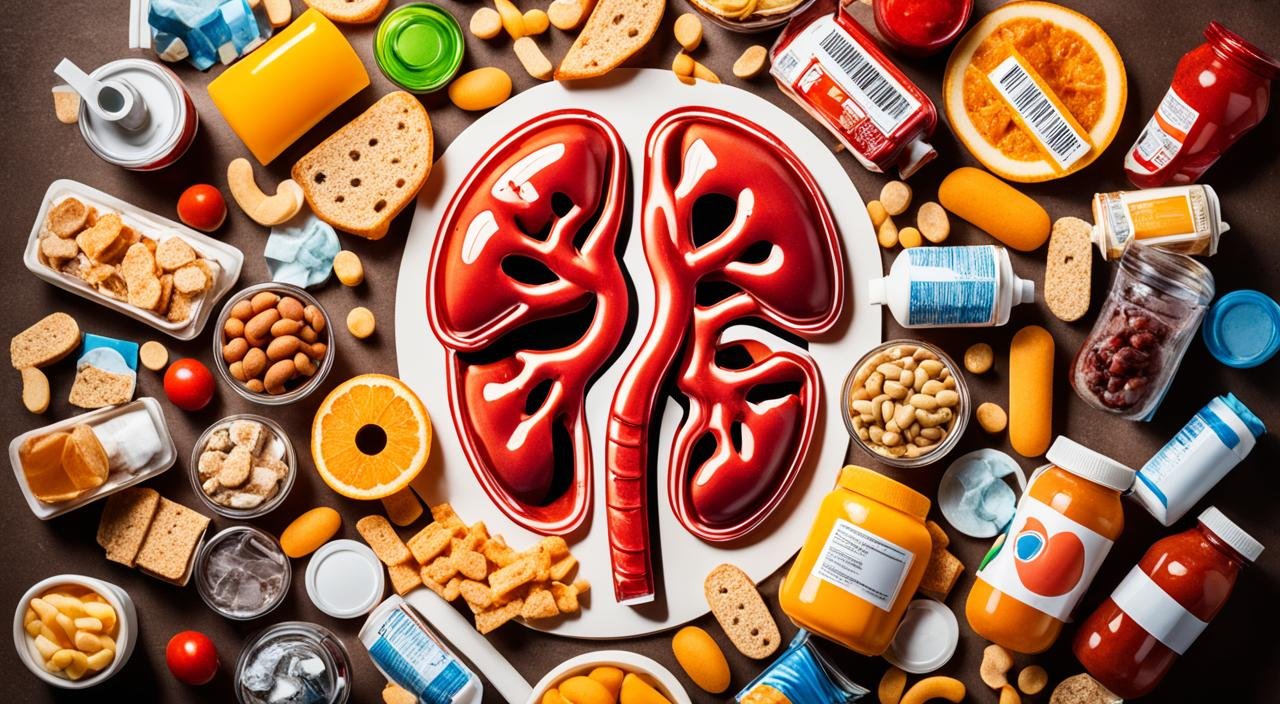Kidney disease can greatly affect someone’s health and quality of life. The kidneys are vital organs that filter waste from our blood. They also keep our fluid balance in check and help make red blood cells. If the kidneys don’t work right, waste can build up and cause serious problems.
Managing kidney disease involves watching what you eat. A good diet can slow down the disease and reduce its symptoms. In this piece, we’ll look at how diet and kidney disease are connected. We’ll cover what foods are good for kidney health, give dietary advice, and talk about handling sodium, potassium, and phosphorus.
Key Takeaways
- Kidney disease can significantly impact overall health and well-being.
- The kidneys play a crucial role in filtering waste, maintaining fluid balance, and regulating red blood cell production.
- Diet is an essential component in managing kidney disease, as it can help control disease progression and alleviate symptoms.
- This article will explore the relationship between diet and kidney disease, including dietary recommendations and strategies for managing key nutrients.
- Understanding the role of diet in kidney health is crucial for individuals with kidney disease.
Also Read : Top 10 Healthy Eating Tips You Need To Know
Understanding Kidney Disease
The kidneys are crucial for overall health. They filter blood to remove waste and extra fluid. They also help balance fluids, control blood pressure, and make red blood cells. Kidney disease comes in many types, from acute kidney injury (AKI) to chronic kidney disease (CKD).
Also Read : What Is Credit Risk And Why Is It Important In Finance?
Overview of Kidney Function
Kidneys have key roles in the body. They filter the blood to get rid of waste and water. This waste leaves the body as urine. They also manage fluid levels, blood pressure, and make sure enough red blood cells are produced.
Types of Kidney Disease
Kidney disease comes in two main types:
- Acute Kidney Injury (AKI): This is a quick drop in kidney function. It’s often due to dehydration, infections, or some medicines.
- Chronic Kidney Disease (CKD): This is when kidney function slowly gets worse over time. Causes include diabetes, high blood pressure, and glomerulonephritis (kidney filtering units’ inflammation).
It’s important to know the types of kidney disease. This helps in finding the causes and right treatments.
Also Read : Top 10 Benefits Of Apples For Your Health
“Early detection and management of kidney disease are essential for preventing further deterioration and improving patient outcomes.”
The Role of Diet in Kidney Disease
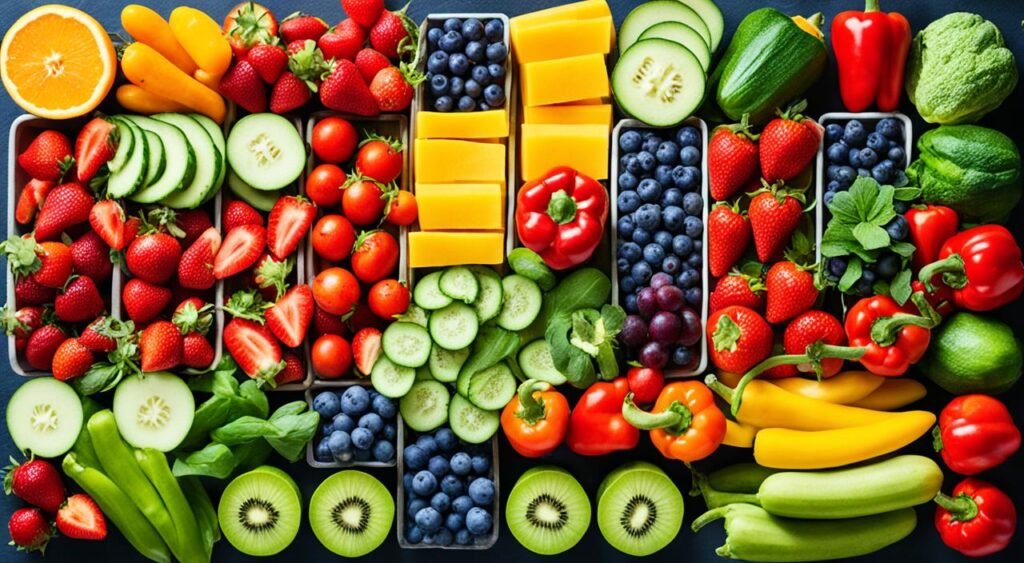
Diet is key in handling kidney disease. What we eat and drink can greatly affect kidney health. For those with kidney issues, it’s vital to adjust what they eat to reduce waste build-up and protect their kidneys.
A diet for kidney health balances nutrients like protein, sodium, and potassium. This diet helps to slow down the disease, reduce symptoms, and make people feel better. They can also use it to control their weight and blood pressure.
Also Read : How Can Celebrating Small Successes Keep Students Motivated?
This type of diet is not one-size-fits-all. Everyone needs a plan that’s just for them. Working with a dietitian or health provider can make a big difference. They will create a special nutrition plan to fit individual needs.
| Nutrient | Importance for Kidney Health | Dietary Considerations |
|---|---|---|
| Protein | Protein is crucial for health, yet too much might hurt the kidneys. | People with kidney issues might need to cut down on protein. |
| Sodium | Sodium balances fluids, but too much can harm the kidneys and raise blood pressure. | For those with kidney troubles, limiting sodium is crucial. |
| Potassium | Potassium is vital for the body, but it can be risky for kidney patients in large amounts. | Kidney patients might need to control potassium and shun foods like bananas and oranges. |
| Phosphorus | Phosphorus supports bone health, yet too much can cause issues with minerals and bones. | People with kidney problems should watch their phosphorus intake, avoiding high-phosphorus foods. |
Knowing how food affects kidney disease leads to better health. With the right diet changes, people can play a big part in their health. They can manage their condition and feel better day by day.
Also Read : How Can You Make Cheese Pizza ?
Dietary Recommendations for Kidney Disease
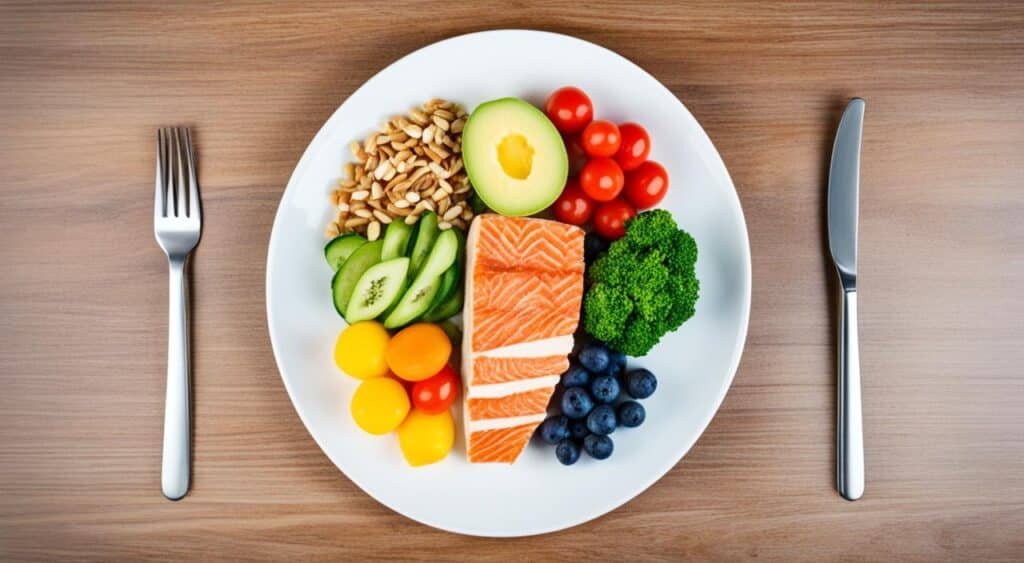
Diet is vital for managing kidney disease. It’s important for patients to watch their intake of certain nutrients, like sodium and protein.
Sodium Restriction
People with kidney disease must limit their sodium. Too much sodium can cause fluid to build up, high blood pressure, and strain on the kidneys. They should aim for less than 2,300 milligrams of sodium a day.
Protein Intake
The right amount of protein is key for those with kidney disease. Too little can cause muscle loss and malnutrition. But, too much can stress the kidneys. The amount needed changes depending on disease stage and other factors.
| Nutrient | Recommended Intake for Kidney Disease |
|---|---|
| Sodium | Less than 2,300 mg per day |
| Protein | Varies based on individual factors and disease stage |
Focusing on the right kidney disease diet can slow the disease and boost health. By following dietary advice closely, individuals can protect their kidneys better.
“Proper nutrition and dietary management are essential components of comprehensive care for individuals with kidney disease.”
Managing Potassium and Phosphorus
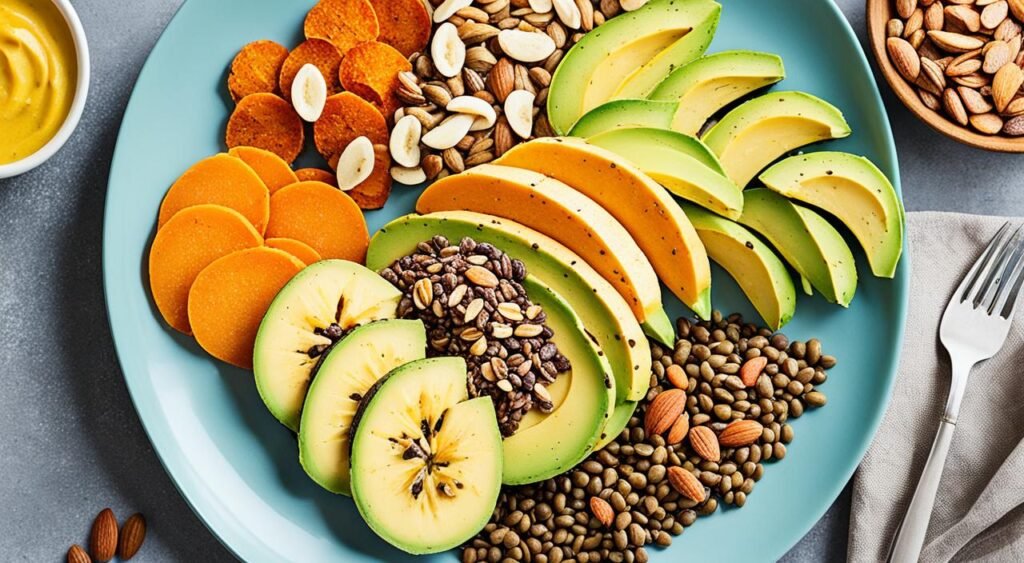
People with kidney disease have to watch more than just salt and protein. They must manage potassium and phosphorus levels too. Too much of these minerals can harm the body. So, it’s important for them to pay close attention to their diet.
Foods High in Potassium
Potassium helps with body balance and proper muscle and nerve work. But, for kidney disease patients, too little is dangerous. Foods high in potassium are:
- Bananas
- Oranges
- Potatoes
- Dairy products
Foods High in Phosphorus
Kidney disease patients should also be careful with phosphorus, found in many foods. Too much phosphorus can cause harm. Foods that are rich in phosphorus are:
- Dairy products
- Meat
- Poultry
- Processed foods with added phosphates
Those with kidney disease need to eat less high-potassium and high-phosphorus foods. Their doctor might also suggest using phosphate binders to help.
“Careful management of potassium and phosphorus is crucial for those living with kidney disease.”
Learning about potassium and phosphorus helps kidney disease patients. They can choose the right foods. And, they work with doctors to stay healthy and well.
Kidney Disease and Fluid Intake
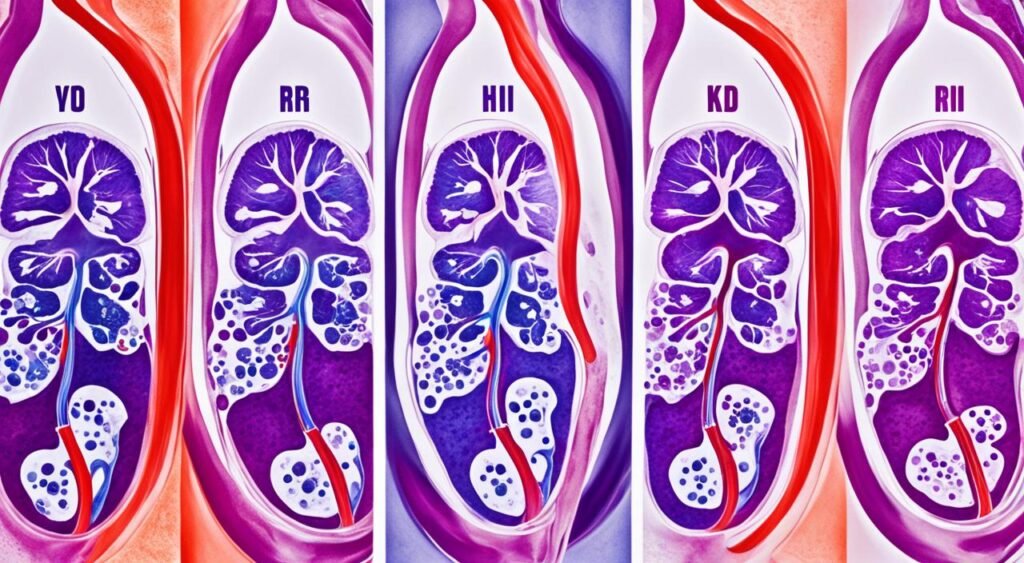
For people with kidney disease, watching how much they drink is very important. The kidneys help our bodies keep the right amount of fluid. But if they don’t work well, you might get too much fluid or not enough.
Doctors work out the best amount of fluids each person should have. They check things like how much you pee, your blood pressure, and if you’re swelling up. This personal care in fluid intake in kidney disease helps in staying healthy and stopping more kidney trouble.
Monitoring Fluid Intake
If you have kidney disease, you might need to drink less to avoid swelling up. Still, staying hydrated is key for good health and kidney function.
Here’s how patients can handle fluid intake in kidney disease:
- Keep track of how much they drink each day, including all fluids
- Not eat foods that are mostly water, like soups, or very juicy fruits, too much
- Stay away from a lot of coffee, tea, or alcohol because they can dry you out
- Tell your doctor right away if your pee changes or you start feeling off
Importance of Hydration
Even though cutting back on fluids is usual for kidney disease, staying hydrated is still vital. Drinking enough water can help your kidneys, clean your blood, and stop sicknesses like UTIs.
Doctors might set a goal for how much you should drink, depending on your health and kidney situation. They’ll want to keep checking and changing your fluid management in kidney disease to make sure your kidneys and you stay well.
“Proper fluid intake is essential for individuals with kidney disease, as it helps maintain a healthy balance and prevent complications.”
In the end, keeping an eye on fluid intake is crucial for people with kidney problems. By teaming up with their doctors, patients can come up with a plan for fluid intake in kidney disease that’s just right for them. This really helps with staying healthy and keeping the kidneys in good shape.
Kidney Disease and Calorie Needs
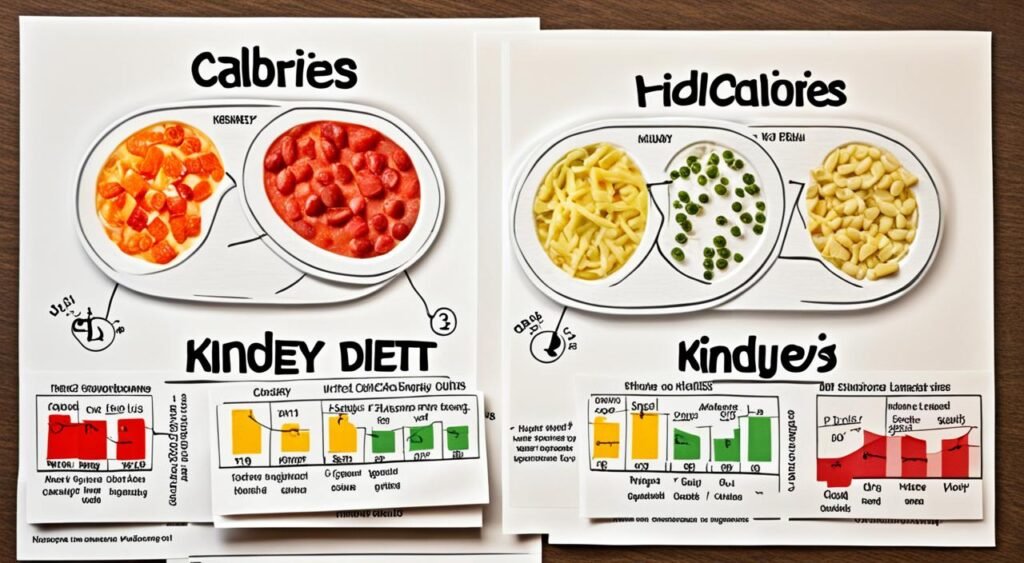
For those with kidney disease, getting the right calories is key. How many calories someone needs can change during different stages of the disease. People may need more or less protein and energy. This is to keep their muscles strong and their health up.
In some cases, people with kidney disease might not feel like eating or could be burning more energy than usual. This could mean they need fewer calories. So, it’s important for healthcare teams to figure out what’s best for each person. They look at individual needs and health to set the right calorie needs in kidney disease, nutritional requirements in kidney disease, and energy needs in kidney disease.
Getting help from a healthcare team is critical. They provide checks and advice to make sure someone’s diet is on point. A personalized nutrition plan can be a big help. It’s geared towards each person, aiming for better health and well-being.
| Nutrient | Recommended Intake for Kidney Disease |
|---|---|
| Calories | 30-35 kcal/kg body weight |
| Protein | 0.6-0.8 g/kg body weight |
| Sodium | 2-3 g/day |
| Potassium | 2-4 g/day |
| Phosphorus | 800-1,000 mg/day |
Each person’s calorie needs in kidney disease, nutritional requirements in kidney disease, and energy needs in kidney disease may be very different. It all depends on their condition and general health. Working closely with healthcare providers to tailor a nutrition plan is crucial. This plan is designed just for them.
“Proper nutrition is a critical component of managing kidney disease and supporting overall health. Healthcare providers play a crucial role in determining the appropriate calorie and nutrient intake for each patient.”
Vitamins and Minerals for Kidney Disease
People with kidney disease should watch their intake of certain vitamins and minerals. They might not get enough vitamin D, calcium, and iron. This is because their diet may be limited. To help, doctors suggest using nutritional supplements or adding certain foods to their meals.
Not getting enough vitamin D is a big issue for these folks. Vitamin D is vital for strong bones and a healthy immune system. Since the kidneys help activate vitamin D, trouble with them can lead to low vitamin D levels. Taking vitamin D supplements might be necessary.
Calcium is another mineral to focus on. Kidney disease can mess up how the body handles calcium. This increases the odds of bone problems like osteoporosis. Your doctor might advise taking calcium supplements or eating foods rich in calcium to keep your bones healthy.
- Foods high in calcium include dairy products, leafy greens, and fortified foods.
Also, many people with kidney disease lack iron. Factors like blood loss during dialysis, not eating enough iron-rich foods, or difficulty absorbing iron can play a part. To fix this, doctors may suggest iron supplements or adding foods like red meat, poultry, and legumes to their diet.
“Proper nutritional support is essential for individuals with kidney disease to maintain optimal health and prevent the development of additional complications.”
Teaming up with their medical team helps those with kidney disease a lot. They can form a plan to get the right vitamins and minerals they need, either through food or supplements. This approach is key to avoid nutrient deficiencies and having a better life.
Also Read : Experts Reveal How To Live Up To 100 Years
Kidney Disease and Heart Health
Kidney disease and heart health are closely linked. People with kidney disease have a higher risk of heart problems. This is because kidneys help control blood pressure and fluid. So, if kidneys don’t work well, it can hurt the heart too.
Managing what people with kidney disease eat is key. They should watch their intake of sodium, potassium, and phosphorus. This can lower the chance of heart issues from kidney disease.
- Less sodium can keep high blood pressure in check, cutting heart risks.
- Keeping potassium levels just right is crucial for heart health.
- Eating less phosphorus helps stop its buildup, reducing heart disease risks.
With the right diet, those with kidney disease can help their heart. They lower the risk of heart-related troubles.
“Proper dietary management is crucial for individuals with kidney disease to maintain cardiovascular health and reduce the risk of heart-related complications.”
The link between kidney disease and heart disease is not simple. Things like hypertension and diabetes can cause both. So, a full health plan is needed.
Seeing how kidney disease and heart health are tied helps. People can do things to keep healthy and lower risks.
Dietary Sources of Uremic Toxins
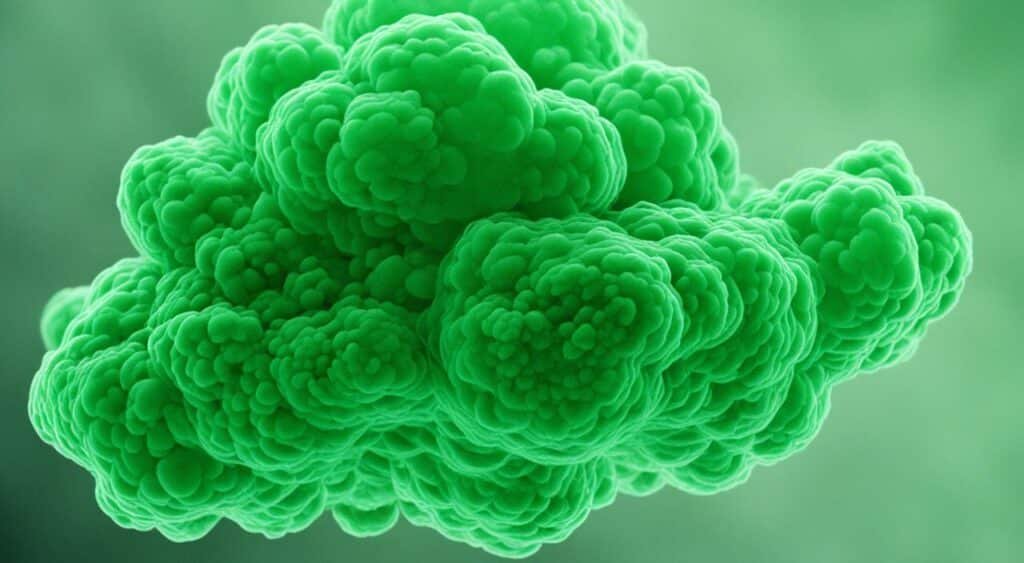
In people with kidney disease, uremic toxins build up and can make the disease worse. Normally, our kidneys filter these toxins out. But if your kidneys don’t work well, these toxins can stay in your body. Knowing where these toxins come from in our diet is crucial for those with kidney disease. It can help them avoid these toxins and stay healthy.
Red meat is a major source of uremic toxins. Compounds in red meat, like creatine and carnitine, can turn into uremic toxins with the help of gut bacteria. Dairy products are also on the list. They have substances like phosphorus and protein that can lead to uremic toxins.
Processed foods are no good either. Think cured meats, salty snacks, and baked goods. These foods can have preservatives and too much sodium or phosphorus that add to uremic toxins.
If you have kidney disease, knowing what to eat is key. Making smart food choices can lower the risk of taking in too many uremic toxins. This might even help slow down your illness.
“Dietary choices can play a critical role in managing kidney disease and the buildup of uremic toxins.”
- Limit eating red meat to lessen uremic toxin production.
- Go for dairy substitutes that are low in phosphorus, like almond or cashew milk.
- Stay away from processed foods high in sodium, phosphorus, and additives that can raise uremic toxin levels.
Choosing the right foods can make a big difference for those with kidney disease. It can help keep uremic toxin levels down and maybe slow down the disease.
Conclusion
The right diet is crucial for managing kidney disease. It helps control waste, keeps a good balance of fluids, and boosts health. This means avoiding too much salt, and watching how much potassium and phosphorus you eat. Make sure to get enough protein and calories.
Also, focusing on certain vitamins and minerals helps. It’s important to steer clear of foods high in uremic toxins. Working with doctors and dietitians is key. They can help create a custom diet plan. This plan can slow down the disease, reduce symptoms, and make life better.
The bottom line is clear. Following a smart, kidney-friendly diet can really help your kidneys work better. With the right food choices, people with kidney disease can do a lot to stay healthy and improve their future.
